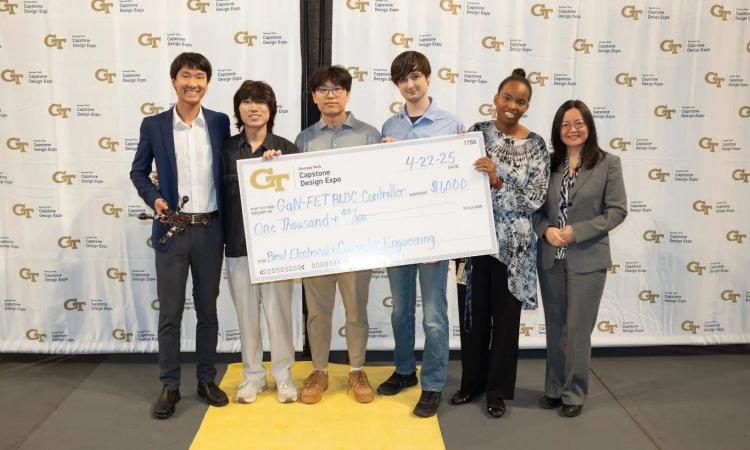With another second-place finish under their belt, the interdisciplinary club is closing in on the finish line with lessons learned and first place in sight.
(text and background only visible when logged in)
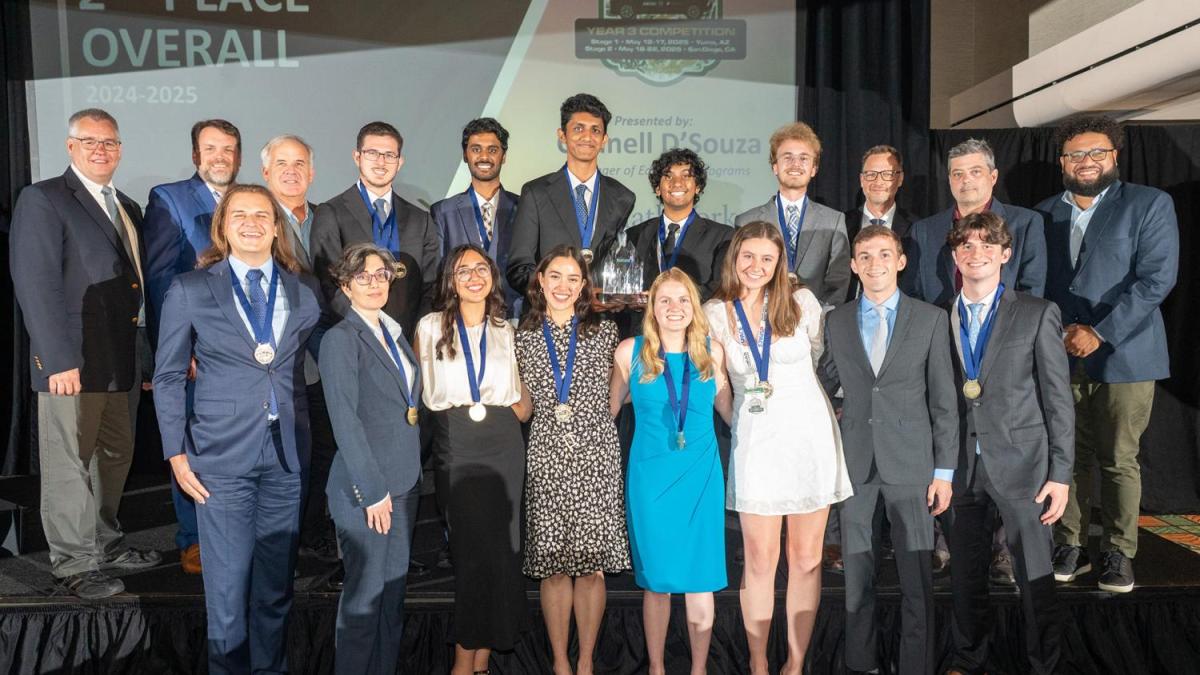
Three years ago, the Georgia Tech EcoCAR team was given a 2023 Cadillac LYRIQ and two objectives: turn it into an all-wheel drive vehicle and implement autonomous capabilities.
After hard work from students across the Georgia Tech campus, including from the College of Engineering, College of Computing, and the Ivan Allen College of Liberal Arts, the team’s car now has two electric motors and autonomous driving capability.
But, how would the new features hold up at the Year Three Competition? After a second-place finish at last year’s competition, the car needed to perform even better under much tougher scrutiny this year.
When the nearly two-week-long competition came to an end, the Yellow Jacket team once again proved to be among the best in EcoCAR, finishing second overall.
The EcoCAR EV Challenge is a collegiate competition sponsored by the US Department of Energy, General Motors, and MathWorks, and managed by Argonne National Laboratory. The four-year program spans 2022-2026 and features annual competitions.
The Georgia Tech team is one of the Institute’s largest Vertically Integrated Projects, under the guidance of School of Electrical and Computer Engineering (ECE) Professor David Taylor, along with George W. Woodruff School of Mechanical Engineering (ME) Professors Antonia Antoniou and Michael Leamy.
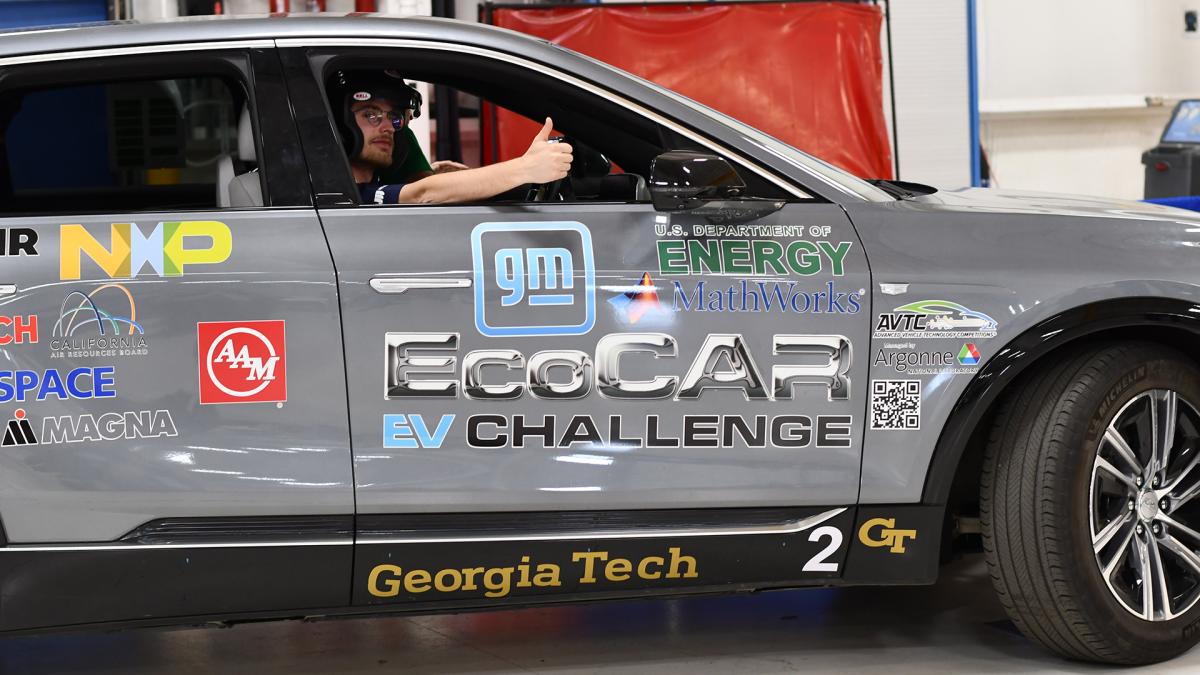
Project manager Eric Gustafson giving a thumbs up to the rest of the team after passing high speed ORSE.
From Setbacks to Success
The Year Three Competition started in Yuma, Ariz., at the GM Desert Proving Grounds. During the two-week event, GM engineers pushed each team’s car to the limit across nine dynamic events.
In last year’s competition, Georgia Tech’s vehicle was one of just two vehicles that were able to move under their own power and compete in the events.
This year, all 13 teams arrived with running vehicles, making reliability and robustness the differentiators.
Critical at this year’s competition was the high-speed On Road Safety Evaluation (ORSE), where GM engineers drove the vehicles up to 70 miles per hour making unconventional maneuvers to test safety, stability, and reliability. This event must be passed before moving on to others.
“We failed this event in year two,” EcoCAR project manager and ME graduate student Eric Gustafson said. “We needed to complete this event to compete in the others, but just passing it was a milestone the team really hoped to accomplish this year.”
Reaching the milestone didn’t come easy. The team had many mechanical delays that kept them off the track until the final day. Then, an unexpected maneuver exposed a rare software issue resulting in a motor fault and delaying their run.
“Last year a mechanical problem caused us to fail, but this year it was software,” Gustafson said. “We didn’t have any idea what the problem was.”
In a Hail Mary attempt, Gustafson reached out to last year’s team lead and the motor manufacturer, Magna Powertrain. Within 20 minutes, both responded and recommended the same solution. Georgia Tech passed the event with only hours to spare.
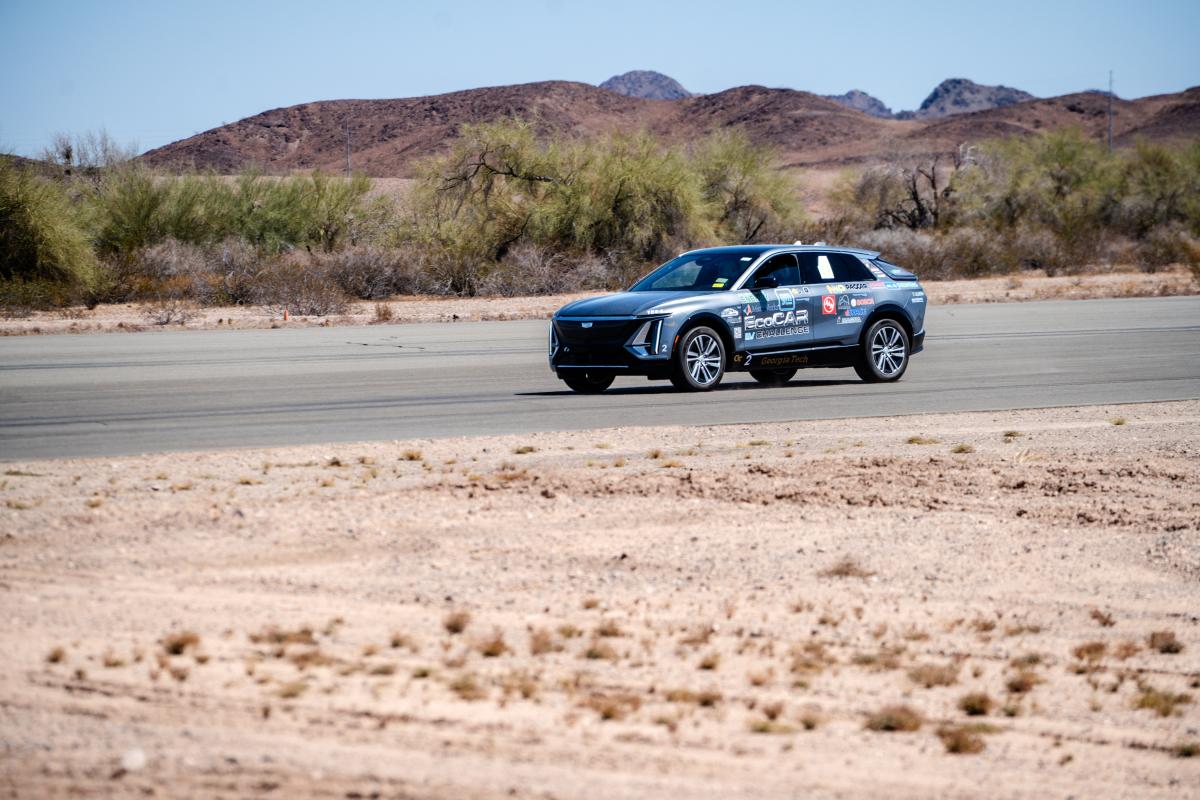
The team’s vehicle out on the Skidpad at GM’s Desert Proving Grounds in Yuma, Ariz.
Performance Meets Purpose
After the dramatics of the ORSE event, the team attempted seven other dynamic challenges, completing four propulsion events and two autonomous events.
Another event, called Mobility Challenge, encouraged teams to help an underserved community in the automotive space. The team chose to create an affordable rigid wheelchair lift to help drivers with spinal cord injuries get into a car more easily. The project took second place in its category.
“It was an amazing experience,” ECE graduate student and Mobility Challenge lead Katelyn Potts said. “The result means industry professionals approved our design and validated the time and energy we put into this project.”
Top Marks, On and Off the Track
Week two of the competition moved to San Diego and was all about presentations.
Each of the six sub-teams presented their work to a panel of experts for a chance to earn the team more points towards the overall placement.
The Communications sub-team took first place in their category. This sub-team goes beyond the engineering parts of the project, making it a truly interdisciplinary experience.
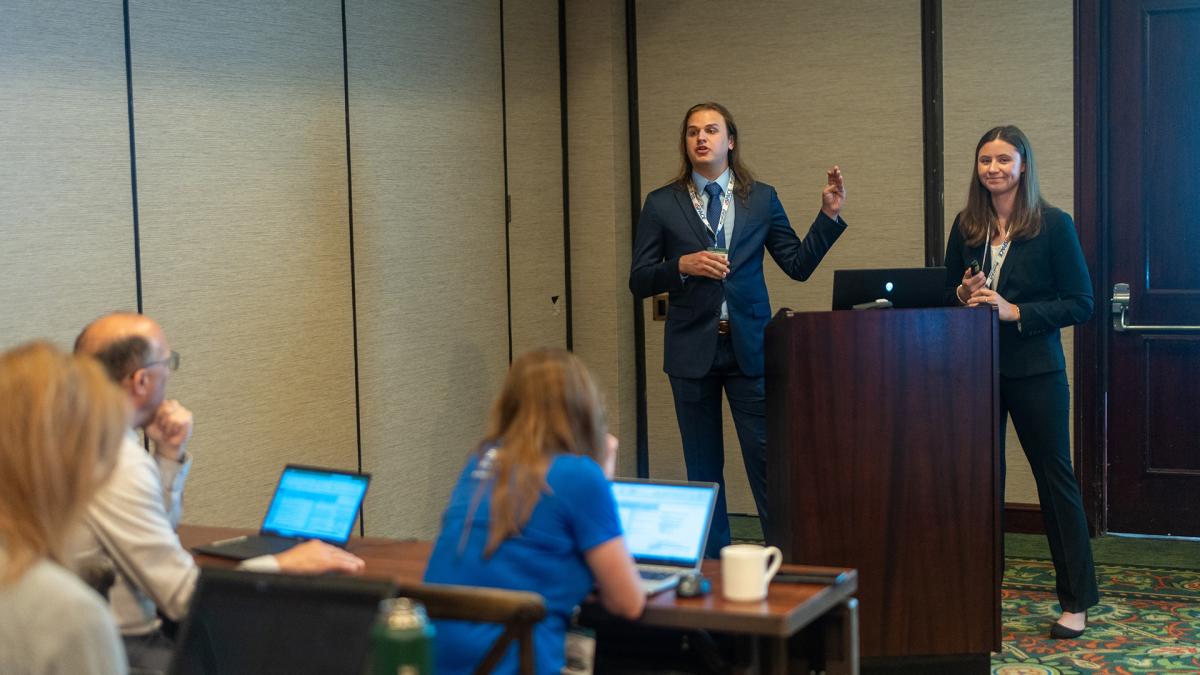
PCM Graduate and Undergraduate leads Kallen Cunningham and Rose Rye presenting to a panel of industry experts.
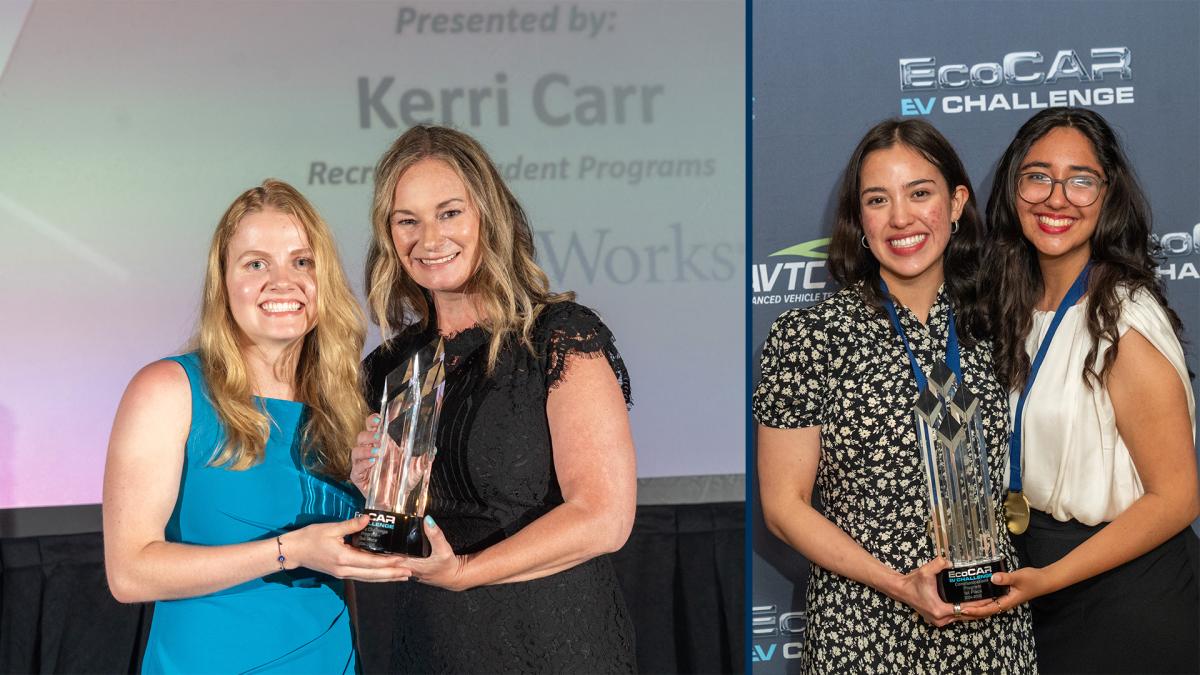
(Left) Mobility lead Katelyn Potts presented with the 2nd Place Mobility Overall Award. (Right) Communication Managers Natalia Alvarez-Rodriguez and Suhani Mahajan presented with the 1st Place Communications Overall Award.
Students Natalia Alvarez-Rodriquez and Suhani Mahajan in the School of Literature, Media, and Communication (LMC) are responsible for all outward-facing communications for the Georgia Tech team, such as managing social media and organizing outreach events to engage the Atlanta area on sustainable energy.
This year, their coordination with youth outreach programs to foster interest in STEM within the metro Atlanta community stood out. They spent the last year helping to integrate accessible STEM topics into the curriculum of several local schools.
“It’s been a great learning experience, not just for us, but for the kids and our engineers as well,” Mahajan said. “I like to joke that if I can plan an event for 107 first graders, I can plan pretty much anything now.”
Other notable finishes for the Georgia Tech EcoCAR team included:
- First Place Consumer Ride and Drive
- First Place Longitudinal Acceleration
- First Place Vehicle Driveability Evaluation
- First Place Connected and Automated Vehicle Systems Presentation
The Final Stretch
The team is now moving ahead with preparations for the final year of the EV design cycle. Their goals are even loftier next year with plans to build a market-ready vehicle.
The team will spend the final year shoring up weaknesses exposed at this year’s competition and diving deeper into the autonomous functions, with an aim to complete every dynamic event at the final competition next year.
“We have big hopes for next year, and we have a really great team returning,” Gustafson said. “Our entire team is super proud of what we've accomplished this year, and we really believe that we're in a really great spot going into next year.”
For more information on the Georgia Tech EcoCAR team, click here, and listed below are the leadership positions held by individuals from around the Institute:
| Michael Leamy | Lead Faculty Advisor | ME |
| David Taylor | Faculty Advisor | ECE |
| Antonia Antoniou | Faculty Advisor | ME |
| Eric Gustafson | Project Manager | ME |
| Katelyn Potts | Mobility Program Lead | ECE |
| Natalia Alvarez-Rodriguez | Communications Manager | LMC |
| Suhani Mahajan | Communications Manager | LMC |
| Prathik Reddy | Systems Design & Integration Graduate Lead | ME |
| Mason Shackelford | Systems Design & Integration Undergraduate Lead | ME |
| Kallen Cunningham | Propulsion Controls & Modeling Graduate Lead | ECE |
| Rose Rye | Propulsion Controls & Modeling Undergraduate Lead | ME |
| Akash Umashankar | Propulsion Controls & Modeling Team Member | ME |
| Paul Barsa | Connected & Automated Vehicles Graduate Lead | Robotics |
| Sebastian Morgenstern | Connected & Automated Vehicles Undergraduate Lead | Computer Science |
| Taran Agnihotri | Connected & Automated Vehicles Graduate Co-Lead | Computer Science |
(text and background only visible when logged in)
Related Content
Efficiency and Affordability Drive Groundbreaking ECE Projects at Spring 2025 Capstone Design Expo
The winning ECE project advances UAV technology using gallium nitride semiconductors, while the interdisciplinary winner creates affordable, precise reaction wheels for better satellite orientation control.
Silicon Jackets: Pioneering a New Pathway from Classroom to Career in Chip Design
The Silicon Jackets hope to reduce the gap between graduation and employment, providing students with practical experience to accelerate their careers in chip design.
